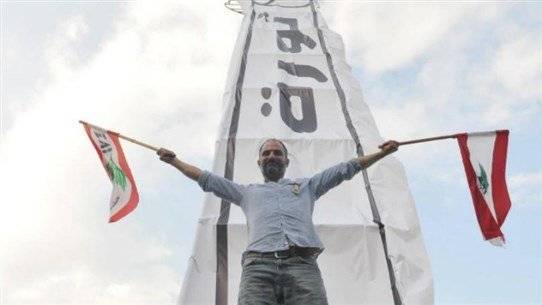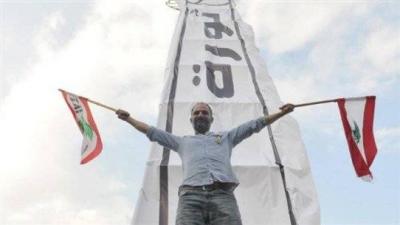Movement or uprising or revolution? The names differed, as did the motivations, mechanisms, and goals. But it is certain that many who took to the streets that day expressed a shared pain. Understanding the causes of that pain was, and still is, foggy. The majority of the public's anger towards the authorities quickly turned into conflicts among themselves. The authority was shaken for a moment but did not collapse, and the people's pain continues. Here is a quick recap of "October 17" from the perspective of some who participated or supported it.
We start with researcher and political activist Zina Helou, who noted that the feeling of disappointment among Lebanese people began to grow after the 2016 presidential settlement and the 2018 elections, leading to their subsequent disillusionment with budget failures, random employment, tax increases, and more. However, the actual unrest began to escalate from September 2019 with restrictions on ATM withdrawals, followed by gasoline queues and bread crises, culminating in the explosion on the 17th.
“The uprising managed, for the first time in Lebanon, to divide the country horizontally among people from different sects against the authority, which completely confused the latter. It sought by all means to break this horizontal alignment and recreate a vertical one based on sectarian rather than class affiliations, and it succeeded in that,” Helou said. The obstacles did not stop there, as the issues raised by the "revolution" were scattered, and since there was no organization, its fate was inevitable. In addition, some political forces rode its wave, the inexperience of some participants on the ground, and the collusion of others elsewhere.
Has everything ended? She responds: "The problem is that we refuse to bury the revolution. Some things end and we must accept their end. The revolution did what it did at that time, but now we must read and learn from it to move to another stage. Living in a state of nostalgia for it prevents the emergence of an extension of the October 17 movement,” according to Helou, who concludes by saying: “What Lebanon lacks is changing the social structure founded on the normalization of clientelism, considering the individual as tied to sectarian, regional, and political circles, and replacing it with the principle of citizenship and the demand for rights. Change needs time, especially in a diverse and divided society, which requires organization and raising awareness to form a powerful force that can shift the power balances with the existing system.”
### Repression and the Inflation of Ego
The opinions of "the revolutionaries" were divided regarding the role of the Kataeb Party in it, between supporters and opponents. Alaan Hakim, a member of the party’s political bureau and former minister, considered in an interview with “Nidaa Al-Watan” that October 17 represented a continuation of the "2014 Revolution" initiated by the party from within the government after a series of resignations, as well as the "2016 and 2017 revolutions" where many settlements were rejected, including those that brought General Aoun to the presidency, the waste crisis, the VAT issue, among others.
While affirming that the revolution has not died, he pointed out that it still exists through the reactions we witness regarding state management and its institutions. He added: “Initially, the state and current authority were confused, especially as people gathered massively on the ground, but the brutal use of repression and the infiltration of the popular movement by party and intelligence components led to confusion among the protesters and created problems between them.” The economic deterioration put a stop to possibilities for geographic and popular expansion and had a hammering effect on citizens, as overwhelming them with successive living crises benefitted the authority, in addition to the spread of COVID-19 and the role played by anti-revolution parties that took them off the ground, according to Hakim.
What comes next? “There is no doubt that fragmentation was a key point in the revolution's decline, as not everyone shared the same ideas and direction. It was essential to have a leader for the revolution, but no one wanted to recognize one despite the presence of many neutral figures. The scattering of interests, personal motives, and ego led to what we have reached,” Hakim concluded.
### Absence of Leadership
Retired Brigadier General George Nader attributed, in a phone call with "Nidaa Al-Watan," the participation of the movement of retired military personnel in the revolution not only to the demand for retirees' rights but also to adopting people's demands. “The revolution was neither sectarian nor regional; it resembles us as military personnel. We participated in it hoping for a system amendment, accountability of the corrupt, and judicial independence.”
Nader continued that what began as a social demand movement to combat corruption without any regional dimension was quickly exploited by the parties. The second reason is the failure to impose either individual or collective leadership for the revolution, as the public completely rejected that, leading to deadly chaos. “There is another reason rooted in the "genes" of the Lebanese, which is ego and the love of appearance, and the preference of personal interests over public ones,” Nader said, noting that the revolution currently has three wings: one that sees only "Hezbollah" and its weapons as the cause of the crisis; another that speaks, “Do what you want, but do not come near Hezbollah’s weapons”; and a rational wing that views the removal of that weapon as the primary, but not the only, entry point to achieving state sovereignty.
When asked about the ways to reconnect what was severed, Nader replied: “We must find another way to unite the revolution and change the behavior and political style. The causes of the revolution in their entirety still exist, and the presidential and governmental vacuum—should it occur—could be a reason for its revival.”
### Personal Matters
For his part, the Secretary-General of the "Seven" Party, Dr. Hassan Shams, explained to "Nidaa Al-Watan" the reasons for their participation in October 17, saying: “The problems varied from corruption and political sectarianism to government ineffectiveness and tax imposition without any plan, like spending based on the twelfth of the annual budget, which pushed the party to support the uprising in the quest for change.” He saw that “the revolution contributed to sidelining some parties and personalities, such as the National Party and the Future Movement, but it did not succeed in changing the system, given its funding, octopus-like nature, and its financial and media machinery.”
Regarding the failures, Shams stated that “the revolution was marred by a lack of organization and was not led by a specific party, turning it into an open space for everyone. This multiplicity of parties led to its weakening, especially since there was no majority of one party over the others. Then, the entry of some authority figures on the scene and exploiting it for their interests based on the notion of ‘turning threats into opportunities’ did its part as well.” He added: “The matters were more personal than related to directions, politics, and visions. Despite that, the dream has not died, but a different approach is needed. Each of us has his project. Let the people choose the project they want, but returning to the street will not be effective. Responsibility must be accepted; no one will come to save us unless we save ourselves.”
### Souls Before Texts
We turn to the founder of the "17 Center for Studies and Research," Walid Al-Mahab, who considered in an interview with "Nidaa Al-Watan" that "attempts to blow up the revolution began during the waste crisis in 2015 but took the form of a demand movement at most. The most significant achievement of October 17 was to make the officials think twice before any new offense, as well as reviving a feeling of rejecting sectarian legacies and grudges." He added: "Unfortunately, that national sentiment quickly dissipated for several reasons, the most important of which was the media that superficially provoked the emotions of the revolutionaries, but worked meticulously to consolidate the authority and thwart the revolution, raising suspicions about the slogan 'Everyone means everyone,' the principle and spirit of the revolution."
Al-Mahab saw that "a significant failure was the experience of the 'Revolution Coordination Committee,' as there was a pressing need for it to divide roles and distribute tasks, but it did not last since the majority of revolutionaries were driven by their egos. This, in addition to the failure to fortify the revolution against fragmentation from the beginning, it arose from the community sectors, each with its characteristics and concerns."
He said: "Alongside demonizing the revolution, the authority accused the revolutionaries of communicating with embassies, tarnishing their image, claiming sometimes that they are manipulated by NGOs, and at other times claiming they are an extension of the secret global group 'Otpor,' which uses the raised fist as its symbol. Moreover, the authority's exploitation of the political illiteracy of many revolutionaries reduced the ceiling of changing the political system, including the constitution, to smaller demands. Given that 'the blow that does not kill strengthens', the authority regained its dominance by passing parliamentary elections according to a law tailored to its specifications."
Prioritizing, according to Al-Mahab, requires forming a new authority that accommodates everyone based on a sound electoral law that reflects the true expression of the people's will. While he spoke of an integrated package of solutions consisting of a popular legitimacy council, a transitional governing council, and a sound election law, it should be entrusted to the parliament emerging from those elections to address contentious issues. He did not deny the prior knowledge of the existence of many counter forces, some of which revolve around the authority and others that are considered reformists.
From the 14th and 17th to… The Lebanese Forces initially chose to oppose from within the executive authority, later to support—often unilaterally— the protesting street before leaving amid the changing field developments. What does Charles Jebour, head of the media and communication apparatus in the party, say to “Nidaa Al-Watan” about that phase and what preceded and followed it? He believes that “the first revolution happened on March 14, 2005, and it was a sovereign revolution par excellence and transcended sects aimed at restoring sovereign decision-making. In contrast, October 17 is a social revolution with financial and economic dimensions. Ultimately, the objective convergence between the two revolutions exists because financial and social collapse only occurs due to the absence of sovereign decision-making.”
He added: “The strength of the March 14 revolution lay in its reliance on parties and its grounding in a clear political narrative, principles, and vision. However, October 17, despite mobilizing Lebanese public opinion, did not possess that clear political vision, as it confused the right with the left, the sovereign with the populist, and the social with the financial, while excluding the sovereign dimension.”
The slogan "Everyone means everyone" was described by Jebour as a historical fallacy of the revolution, explaining that the importance of March 14 arose from the division of what came before and after, away from accounting for the past: “Some sought to blow up the revolution from within through that slogan. How can one equate between those who are with Hezbollah's weapon and the state’s logic and those who are against the weapon and the logic of the mini-state? The feeling of 'angels among demons in this nation' ultimately undermined the revolution.”
A sovereign revolution emerges from the wombs of both the 14th and 17th revolutions, learning from those experiences, leading to an overwhelming state achieving two main objectives: the establishment of a sovereign state and its management with transparency by real statesmen. This is what Lebanon needs, Jebour concluded.




